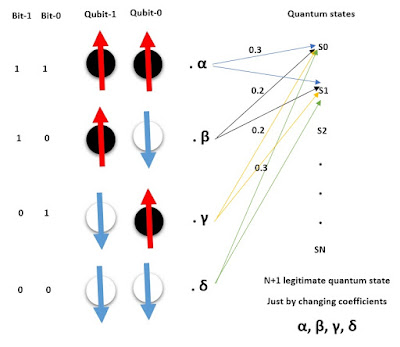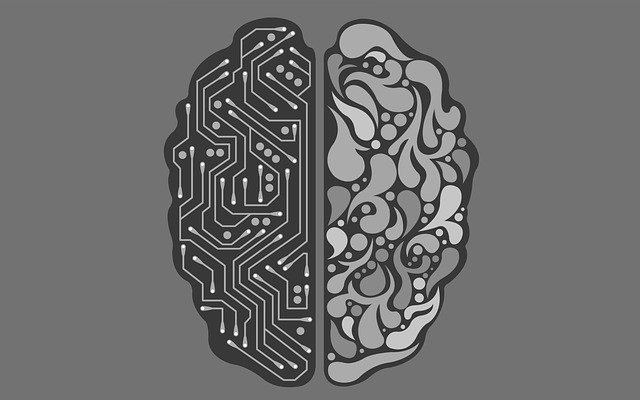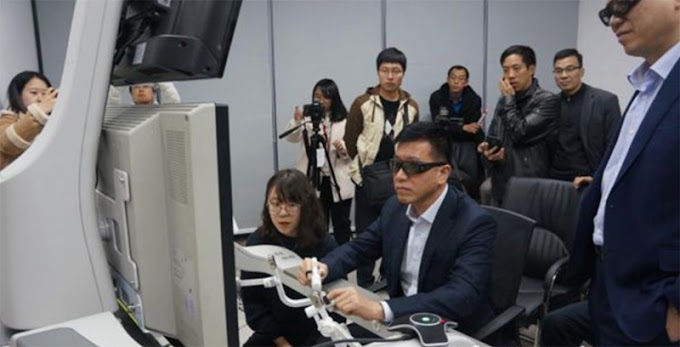We all know what is computers, right?
It is empowering the world from the last 40 years. And now, we can’t imagine our world without it.
The computer we know works in the
principle of ‘binary number system’, in which any quantity is represented by
zeros and ones. And by using these combinations of zeros and ones we have
reached ‘the Mars’, we are probing ‘the Sun’, taking ‘black hole’s image’, gliding drones,
connecting people with 5G, and much more.
But there are some areas in science and
technology in which calculating things by using the conventional computer takes
a very long time even if a supercomputer is used. For example, Cryptography,
drug discovery, genetic engineering, etc.
In this article, we cover up all the
things you need to understand the ‘quantum computer’ in a very simple language.
Keynote:
what's quantum computer, how quantum computer works, quantum computer
applications, Real life quantum computers, Some FAQ on quantum computers
 |
| Credits: IBM Zurich Lab, D-Wave Systems, Inc., NASA Ames / John Hardman, |
What's quantum
computer?
In the introduction
to this article, we have noted that in the conventional computing devices any
quantity is represented by zeros and ones. If we take an example and consider
the number 4, it will be represented by 0100 in a 4-bit binary system.
By using the same
4-bit binary system we can count 0000 to 1111 which is equivalent to count from
0 to 15, makes sense right? If not please visit here. But, in a quantum
computer, we can count a much higher number which classical computers cannot.
How? Let’s
see. In classical computer with 2 bits can represent a total of 4 different
states. A quantum computer is created with a ‘quantum
bit (qubit)’ which not
only the information 0 & 1 (just like a classical computer) but also, both
0-1 or 1-0.
Which makes a qubit
to be able to represent 2 more information per bit. If we consider an n-bit
classical computer, the equivalent n-qubit quantum computer is able to
represent 2^n (2 the power n) bits of information which is extraordinary in the
field of the computing platform.
Quantum computing and quantum information:
Practically the
quantum computer can be created by utilizing quantum mechanics. In quantum
mechanics, atomic particles show crazy properties. Two of them are ‘superposition’
and ‘entanglement’.
Superposition let
two quantum states to add and create another where entanglement is the
influence of one quantum state into another. So, taking these two incidents
along with the lowest state & highest state of an atomic particle one qubit
can represent 4 different states.
Researchers can use
many different ways to be represented as a qubit. ‘Electron
spin’ is one of them. Sounds
interesting? If so, why don’t
you let other readers know by commenting in the comment section what is an ‘electron
spin’ if you know what is an ‘electron
spin’?
If not, we will help you at the end of the article.
Alright! Each
electron in an isolated atom can have down spin (represent 0), up spin
(represent 1), and can have both by the law of superposition. By accurately
control & detecting the spins of the electrons a quantum computer.
But it is not that
simple as it is explained. Accurately detecting those spins of an electron is
an engineering challenge itself. In-room temperature an electron can exist in
any spin, and by cooling it near to absolute zero confirms that the electron
stays in the down spin state.
Now to transform the
down-spin into an up-spin state the electron must get a quantum of energy. This
can be supplied by applying a strong magnetic field of the frequency the same
as the resonant frequency of the electron concerned.
By applying
superposition of the two quantum bits ( each bit is of one spin ) we can represent any other legitimate states. Quantum computers are fundamentally, architecturally, functionally
different than conventional computers. Any of them cannot replace the other
one.
Real-life quantum computers:
Quantum computer D
Wave: It is the leader in the development and is the world’s
first commercial supplier of quantum computers founded back in 1999. D-Wave
leverages quantum dynamics to accelerate and enable methods for solving
discrete optimization, sampling, material science, and machine learning
problems.
D-wave has developed
4th generation of quantum computers which is having a 2000 qubit! Of capacity.
One can find details of their product and services here.
Quantum computer
IBM: IBM team has been exploring quantum computers since the mid-2000s, in 2010
they succeeded to enable multi-qubit devices. IBM was able to provide quantum
computer cloud services (IBM Quantum) in 2016.
Now they have a
large number of quantum computers available for programming via cloud-based
platforms. One can visit their website and learn how their stuff works?
Currently, they are
targeting 1000 qubit machines which are expected to be operational from 2023.
Quantum computer
Google: Google’s AI Quantum team is advancing
quantum computing by developing quantum processors (that depends on qubits) and
novel algorithms to help researchers and developers to solve some problems
which are theoretically not possible by classical computers.
Google AI quantum
team has been teamed up with NASA and they are much more involved in quantum
computing research. The main area of research is the development of
Superconducting qubit processors, Qubit metrology, Quantum simulation, Quantum
assisted optimization and Quantum neural networks.
 |
| Credits: IBM Q quantum computer |
Quantum computer
RIGETTI: They build and deploy integrated quantum computing systems based on
superconducting qubit technology. Rigetti Quantum chips enable organizations to
scale up with existing classical computational workflows with quantum
processors.
Rigetti quantum
processors consist of three subsystems. First, user programs are converted into
machine-level instructions. Then, a hardware controller converts these
instructions as calibrated electrical signals., and finally, qubits that are
made from coherent superconducting circuit elements transduce these electrical
signals logically as digital quantum gates and measurement instructions.
Quantum computer applications:
As it was mentioned
that by using qubits the quantum computer can have a much greater capacity of
processing parallel data, that allows it to certain very computationally
expensive tasks so fast that the same task might need several years if it would
have been done by classical computers.
For example,
- It
is helping car manufacturer Volkswagen to optimize the route between a
starting point to a destination point. Optimization problems always
require greater numbers of steps to reach an acceptable solution and this
requires much more time. With
a quantum computer, we can run several optimizations algorithms
simultaneously. So Instead of finding the smallest route serially, quantum
computer can traverse parallel routes at the same considering obstacles
& traffics in each road. With the help of D-Wave and VW they are
already running pilot programs on different traffic- and travel-related
optimization challenges, including streamlining traffic flows.
- German
car manufacturer Daimler AG (the parent company of Mercedes-Benz), In
2018, announced two partnerships with Google and IBM to study the battery life of
the Electric vehicles. The
battery life for electric vehicles is mainly based on the functioning of
the battery cell chemistry. Quantum computers might help in areas like
cellular simulation and the aging of battery cells. Evolved batteries for
electric vehicles could help increase the adoption of them into vehicles.
- Quantum
computers might be the solution to the molecular
level simulation of
the very complex synthetic materials, proteins, etc. It is an extremely
complex but a high-yield way of drug development in which proteins are
engineered for targeted medical applications. More importantly, it’s
more accurate than the classical trial-and-error method of running
chemical experiments. Toronto-based
biotech startup ProteinQure has partnered
with quantum-computing leader IBM, Rigetti Computing, & Microsoft with
$4 million of seed funding for finding efficient & easy molecular
simulation for drug discovery.
- Forecasting
weather is
one of the challenging tasks for high-end classical computing platforms.
An everyday huge amount of weather data is being collected by weather
satellites and stations. Proper
analysis and forecast are an extremely tedious job for the computers that
we sue today. The same task can be easily done by ‘qubit’ operated
quantum computers. Ray
Johnson, an independent director at quantum startup Rigetti Computing,
believes that quantum computing’s
method of simultaneous (rather than sequential) calculation will likely be
successful in analyzing extremely complex system of weather variables in a
weather simulation.
- Last
but not the least, Artificial
intelligence (AI) is
one of the areas which is going to get maximum benefit by the use of
quantum computers. The training algorithms of AI can be used in quantum
computers to enhance the speed of Deep learning. Google's CEO
Mr. Pichai said, “I
think AI can accelerate quantum computing, and quantum computing can
accelerate AI.”

Quantum computer in a nutshell
Some FAQ on quantum computers:
- Is quantum computer going to redefine cryptography? Ans: Yes! Certainly. Quantum computers are capable of cracking codes in several minutes which a classical computer might take a few thousand years to breach. So, for national and personal security, study, research of quantum computers has become essential.
- Is quantum computing a threat to bitcoin? Ans: Yes! Again. The explanation given in the previous question is sufficient to get this.
- How quantum computer differ from a classical computer? Ans: Classical computers use bits for calculation, a quantum computer uses qubits. A detailed explanation is given in this article.
- When is quantum computing used? Ans: For the optimization problems, extremely large simulation (for example simulating weather & climate), Machine learning problems, and much more!
- Is quantum computers going to replace classical computers? Ans: No. A Quantum computer has its own application area (explained in the previous question). Actually, a quantum computer is not needed in our day to day computational activities like using a word processor, or watching streaming services, or surfing the internet.
- Why quantum computer is cold? Ans: To precisely control the states of the qubits special conditions are required, for example, for a qubit, to stay at level zero, the temperature should be near to absolute zero.
Conclusion:
In this article, we tried to give an overall idea about quantum computers.
We tried to provide a rough idea of what is a quantum computer, how it works, how
it is fundamentally different than a classical computer?
Few real-life
examples were given to highlight the use of quantum computers. Quantum computer
is a relatively new area of research, study, and application and is a vast one.
One simple blog article cannot give a complete idea of quantum computers.
The goal of this
article was to provide encouragement & information so that one can connect
dots in the vast realm of quantum computers. If it does, the purpose will be
served.






0 Comments
All non-spamy comments will be visible